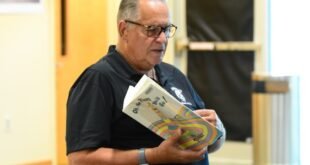
Students who refuse to take next month’s computerized PARCC tests run the risk of being marked absent from school.
Or do they?
The district’s strategy on dealing with students who refuse to take the controversial, state-mandated tests – the full name of which is the Partnership for the Assessment of Readiness for College and Careers exams – is not clear.
That’s partly because, as noted in a Jan. 22 letter to parents from interim schools Superintendent Lee Seitz, “a public school district in New Jersey is not officially sanctioned to implement an ‘opt out’ procedure for State assessments.”
Therefore, the district does not have a policy on how to deal with students who refuse – or, more accurately, whose parents refuse to let them – take the tests.
In his Jan. 22 letter to parents, Seitz wrote: “If your son or daughter indeed misses each opportunity for the assessment (and the make-up examination date), he or she will be marked absent in accordance with the District’s Attendance Policy. Further, the testing coordinator at his or her school will be directed to follow the instructions from the State in terms of how to handle the coding of the assessments.”
What does that mean for students who do not wish to be marked absent and attend school on the days of the testing, but who refuse to take the test? The answer is, well, murky.
Referring to Seitz’s statement in his letter that the district does not have a policy regarding student refusing to take state-mandated tests, district spokeswoman Mary Clark said in an email that “it is the expectation of the District that students who attend school on the day that the test is to be administered, will sit for the examination.”
So, the district is expecting that parents who do not want their children to take the tests will be keeping them home when the tests are administered.
The district would not comment on on whether students who attend school but refuse to take the tests would be left in the classrooms during the testing periods or would be taken to another room.
And what about those “instructions from the state in terms of how to handle the coding of assessments” for those students who refuse to take the test, as referred to in Seitz’s letter?
“At a recent training, we were informed that districts will receive guidance from the State after students take the assessment,” Clark said in the email.
Township resident Robert Quinn is one critic of the PARCC tests. Quinn – who has two children in the school district, although neither are taking the tests – said the issue is more about social justice.
In a letter on the topic, Quinn explained his opposition to the tests:
- No statewide policy for refusing to take the test.
- The PARCC tests “negatively impacts the most vulnerable in our society and further widens the economic gap.”
- Concerns about data collection on student progress.
- Classroom time is focused on teaching for tests.
- Standards and tests place an emphasis on those students who plan on attending college.
What’s a PARCC?
The computerized tests, which will be given starting in March, quiz students in grades 3 through 12 in English language arts and math.
New Jersey is one of 19 states that comprise the PARCC consortium which will be administering the tests. People opposed to the tests have organized in each of those states and are encouraging parents to “opt-out” their children.
Passing the English and math portions of the PARCC test at least once will be a high school graduation requirement in New Jersey as of 2016.
High school students who do not pass the PARCC test can still qualify for graduation by passing one of the several alternative qualifying tests: the SAT critical reading or math components, the ACT college readiness assessment in reading or math, the Armed Services Vocational Aptitude Battery-Armed Forces Qualification Test (ASVAB-AFQT) or Accuplacer or Accuplacer Math.
Franklin High School may “submit portfolios for students who do not demonstrate competencies through PARCC or Substitute Competencies in English and Math,”according to a letter sent to parents in October 2014 from Jeffrey Charney, the interim assistant superintendent for curriculum.
The district has created on its Web site a section dealing with the PARCC tests, including sample tests. It can be seen here.
 The Franklin Reporter & Advocate Eight Villages, One Community
The Franklin Reporter & Advocate Eight Villages, One Community

